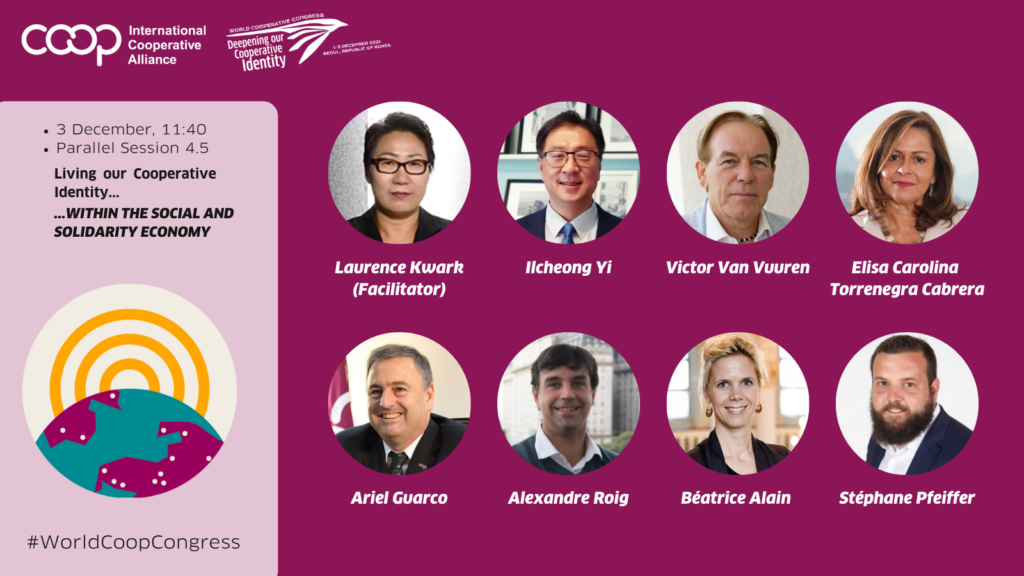
Delegates gathered on the morning of the final day of Congress to discuss Living the Co-operative Identity Within the Social and Solidarity Economy (parallel session 4.5)
Facilitating the session was Laurence Kwark, Secretary General of the Global Social Economy Forum (Korea), who asked panellists how they see the cooperative identity practised to promote inclusive and sustainable development, how it contributes to impactful partnerships within the wider SSE, and what the challenges are.
Speaking in his role as president of Argentinian cooperative apex body Cooperar, Ariel Guarco spoke about how the organisation worked with all the actors in the Social Solidarity Economy to support schemes such as: global development and local employment generation; encouraging people to “buy local, buy cooperative and buy products of the social and solidarity movement; educating the business environment “with our values and principles”; and committing to take good care of people and the planet.
“The cooperative movement has always understood that we cannot build on our own – we need to build together,” he said, adding that he believed the main strength of the SSE is its ability to innovate socially.
“We need to innovate in the way we organize our work and the way we organize labour,” he said. “We need to continue working closely with the International Labour Organization(ILO) and we need to rethink a future of work that is person-centred. We need to be innovative in how we see and we work in the financial system, in the way we produce and consume, in how we adopt new technologies so that they serve the development of individuals and don’t lead to further labour precariousness – and we need to be innovative in the way we generate ecosystems in our communities, economies and ecosystems that promote peaceful coexistence, prevent conflicts and help to unite us.”
Also from Argentina, Alexander Roig, president of Argentina’s Institute for Social Economy (INAES), spoke about the need to co-create public policy to bring on board the interests of all the actors SSE. “We try to promote the common good, especially in times of such an economic, social and climate crisis,” he said. “Cooperativism contains the key values that will help us overcome the current challenges … because coops organise production in a way that is more efficient and effective”.
Mr Roig added that although there are many historical reasons that make mutualism and cooperativism go hand in hand, “visibility needs to be increased.”
This point was also emphasised by Juan Antonio Pedreño, president of Social Economy Europe. “I don’t think we do enough to brand and promote the social economy… The pandemic has shown how important SSEs and cooperatives are – we need to better showcase the added value that cooperatives contribute to society and the wider business world.
He said there are “some windows of opportunity that are opening for SSE” but believes SSE companies have to work harder to achieve recognition of the role they have in society and the business world. Social Economy Europe has three goals to help this happen: encourage public policies to have people and problems in the centre; create strategies and plans at both national and global level to address the transformation of the economy; and “work on an economic recovery that leaves no one behind”.
Elisa Torrenegra, Co-president of the SSE International Forum and Executive Director, Gestarsalud, described how the social and solidarity economy has “a historic responsibility to create a strong global movement” and says cooperatives will be a key actor to transform the current model. “But in order to share our knowledge we need to show young people, and some of the other actors in society that they need to try and replicate that model.” Coops and other organisations can do that through sharing their experience, transferring knowledge and advocating, she said.
Beatrice Alain, Executive Director of Chantier de l’économie sociale in Canada, described how current social challenges require a transformation of our economic model, which “will require everybody’s participation.” Ms Alain said they want to “co-draft public policy to support communities,” and consider how resources are distributed, adding: “Let’s see how we can share that expertise and our strength to do something together.”
Senior Research Coordinator at the UN Research Institute for Social Development in Switzerland, Ilcheong Yi, said that Covid-19 has given a challenge to the cooperative movement, showing that “the existing paradigm is no longer working.” He believes that post-pandemic “we need a new strategy and a new paradigm … and the experiences of the SSE and cooperatives will play the biggest role in that process.”
Mr Yi went on to stress the importance of youth, saying that there is a need to invite more youth who are interested into the cooperative movement, saying that if this happens, “then I think we don’t have to worry any longer because post pandemic, they will be leading the world.”
Stefphane Pfeiffer, deputy mayor of Bordeaux, spoke about the need for cooperation between local authorities and SSE actors to build a “people-focused economy”. He said that often conversations were limited to the stakeholders of cooperatives and the social and Solidarity Economy. “We must also talk to the citizens and find solutions so that they can be actors of everyday life, and be able to face the challenges that they do. This is the goal of the SSE.“
Victor Van Vuurren, Enterprise Director at the ILO and Chairman of the UN Task Force of the Social and Solidarity Economy, called the social and solidarity economy the “world’s best-kept secret”. He added: “It’s important that we recognize that it is a tool that can advance and access certain rights, jobs and living conditions for people. And the key is going to be partnerships.” But he put a challenge to attendees of the session, saying, “I think at the outset, we need a definition that we can all work on.”
